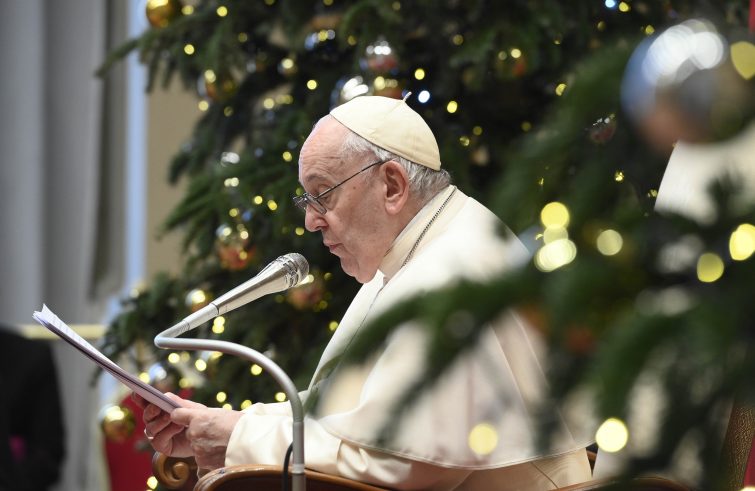
“Sadly, we begin this year as the world finds itself rent by numerous conflicts, large and small, more or less known, but also by the resumption of heinous acts of terror, such as those that recently occurred in Magdeburg in Germany and in New Orleans in the United States”, writes Pope Francis in his traditional New Year greeting to the Diplomatic Corps, read out almost entirely by Msgr. Filippo Ciampanelli, under-secretary of the Dicastery for the Eastern Churches, owing to a lingering cold, as the Pope himself explained after having read the first part of the address.
“In the face of the increasingly concrete threat of a world war, the vocation of diplomacy is to foster dialogue with all parties,
including those interlocutors considered less ‘convenient’ or not considered legitimized to negotiate,” Francis’ recipe. The Pope’s “prayerful hope” for the Jubilee year is that “it may represent for everyone, Christians and non-Christians alike, an opportunity to overcome the logic of confrontation and embrace instead the logic of encounter.” “My wish for the year 2025 is that the entire international community will work above all to end the conflict that, for almost three years now, has caused so much bloodshed in war-torn Ukraine and has taken an enormous toll of lives, including those of many civilians”, reads the central part of the Pope’s address, in which he renews his appeal for a ceasefire and the release of the Israeli hostages in Gaza, voicing his support for a two-State solution for Israel and Palestine, where Jerusalem can be the “city of encounter”, where Christians, Jews and Muslims live together in harmony and respect. In the opening lines, the Pope expressed his “gratitude” to Italian authorities, national and local, for the efforts made to prepare Rome for the Jubilee.
“War is fuelled by the continued proliferation of ever more sophisticated and destructive weapons”, Francis repeats in the address, reiterating his appeal: “with the money spent on weapons and other military expenditures, let us establish a global fund that can finally put an end to hunger and favour development in the most impoverished countries.” “War is always a failure!”, he repeated once again: “The involvement of civilians, especially children, and the destruction of infrastructures is not only a disaster, but essentially means that between the two sides only evil emerges the winner.”
“We cannot in any way accept the bombing of civilians or the attacking of infrastructures necessary for their survival”, the Pope exclaimed: “We cannot accept that children are freezing to death because hospitals have been destroyed or a country’s energy network has been hit.”
“There can be no true peace without the guarantee of religious freedom,” Francis continued, describing as a “source of deep concern” voicing his concern for
“the growing expressions of anti-Semitism, which I strongly condemn,
and which affect an increasing number of Jewish communities around the world”, and deploring “the numerous persecutions against various Christian communities, often perpetrated by terrorist groups.” The Pope sent out a special appeal for Syria, calling on the international community to help Syria “to be a land of peaceful coexistence where all Syrians, including the Christian community, can feel themselves to be full citizens and share in the common good of that beloved nation”, and for Lebanon, that it may recover internal stability.
“A diplomacy of hope is above all a diplomacy of truth”,
writes the Pope, with a warning against the possible pitfalls of artificial intelligence, which require “media literacy education.” The Pope criticized “the cancel culture” that “tolerates no differences and focuses on individual rights, to the detriment of duties towards others, especially the weakest and most vulnerable.”
“It is unacceptable, for example, to speak of an alleged right to abortion that contradicts human rights, particularly the right to life”, Francis reiterates: “All life must be protected, at every moment, from conception to natural death, because no child is a mistake or guilty of existing, just as no elderly or sick person may be deprived of hope and discarded.”
“It is more urgent than ever to recover the ‘spirit of Helsinki’, with which opposing states, considered ‘enemies’, succeeded in creating a space of encounter and did not abandon dialogue as a means of resolving conflicts”, is the Pope’s message to Europe, while highlighting the need to reform multilateral institutions, that “no longer seem capable of ensuring peace and stability”.
“Too many people live as slaves to their work,”
the Pope said, denouncing the “horrific slavery of drug addiction, which affects young people in particular.” Among other forms of slavery in our day, “one of the most dreadful is due to human trafficking by unscrupulous people who exploit the needs of thousands of people fleeing war, famine, persecution or the effects of climate change in search of a safe place to live”, Francis said referring to the migrants “who are forced to walk thousands of kilometres in Central America or in the Sahara desert, or to cross the Mediterranean Sea or the English Channel in overcrowded makeshift boats, only to be turned away or forced to live clandestinely in a foreign country.” “We can easily forget that we are dealing with real persons who ought to be welcomed, protected, promoted and integrated”, Francis warned: “I find it greatly disheartening to see that
migration is still shrouded in a dark cloud of mistrust,
rather than being seen as a source of empowerment. People on the move are seen simply as a problem to be managed.” Eliminating the death penalty in all nations and forgiving the debt of poor countries, were the other requests in the spirit of the Jubilee year, along with the care for our common home.











